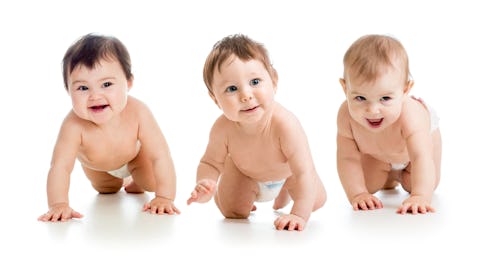Life
This Pregnant Grandmother Is About To Give Birth

The wonders of reproductive technology seem awesome in theory, but in practice some of the results are more than a little surprising, and even unsettling. Cloning is a little weird, but at least they were only doing it to sheep (at first). Totally lab-created organs and limbs are still largely the stuff of science fiction, except for experimental mice growing human ears. But this pregnant grandmother is about to have quadruplets (via Cosmopolitan) — her 14th through 17th children, no less — and you may be unsure how to feel about it.
Sixty-five year old grandmother Annegret Raunigk of Berlin, Germany is 21 weeks pregnant with quadruplets. She conceived via artificial insemination using donor sperm and eggs, and refused to have some of the embryos "selectively reduced" (i.e. aborted) when she learned there were four. If they are all born as planned, she'll become the oldest mother of quadruplets on record. Raunigk already has 13 children (by five fathers) and seven grandchildren. It is an unconventional family, to say the least.
Although "older" mothers are said to give birth to healthier babies than their younger counterparts, this means women who are between perhaps 40 and 50 at the latest. It's hard to see why the same would be true in a woman's sixties, when she would ordinarily be facing menopause (nature's previous way of requiring, not suggesting, that "hey it's time to stop reproducing now"). Though older people often have accumulated wealth, they are also beginning to suffer from chronic health problems of one kind or another, and decreased energy. Worsened eyesight, hearing, and mobility don't exactly make for better parenting.
I used to study and teach bioethics, and (obviously) this case is morally complicated — especially because dependent minors are involved. Surrogacy is sort of illegal in Germany, and it is required by law that adoptive parents have no more than a 40-year age difference with their prospective children. So, although the children Raunigk's carrying won't be biologically related to her, it was strangely easier for Raunigk to bring new children into the world than care for more existing ones.
Although Raunigk is unworried about her health in the future, it's hard to deny mortality statistics. Germany's life expectancy is 81 years right now. I wish Raunigk and her new additions nothing but the best, and hope their time together is as long and happy as possible. Although 40-year-old new moms have become fairly normal, I doubt that 65-year old moms ever will.
Image: Oksana Kuzmina/Fotolia; Giphy